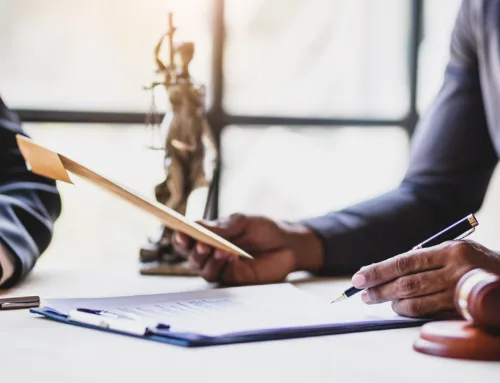Navigating the complexities of a personal injury case can be overwhelming—especially when you’re already dealing with the pain and limitations of an injury. Add unexpected medical bills to the equation, and it can be stressful to say the least. Fortunately, you’re not alone.
In this comprehensive guide, we provide answers to your biggest questions like the role of a personal injury lawyer, how much your case is worth, how settlements work, and much more.
Personal injury law ensures that people who negligently cause harm pay for their mistakes. But it takes a skilled lawyer to navigate the legal maze and deliver the compensation you deserve. Keep reading to learn the intricacies of each step in the legal process, from the aftermath of your accident to the settlement or trial.
What Does a Personal Injury Lawyer Do?
If you or a loved one has been recently injured, you may be wondering what a personal injury lawyer does.
Personal injury lawyers in Atlanta advocate for those injured due to others’ negligence, navigating the legal system to maximize the recovery of the injured party. Personal injury attorneys balance the power dynamic against insurance companies, corporations, and defendants, ensuring a victim’s rights are protected.
With expertise in case evaluation, negotiation, litigation, and more, personal injury lawyers can help you with a variety of cases. Keep reading to learn what types of cases they specialize in.
Types of Personal Injury Cases
Accidents and injuries take many shapes and forms. Maybe a careless driver hit your car, a semi-truck rear-ended you, a property owner didn’t fix a dangerous condition, or a doctor made a fatal diagnosis. Whatever the case, if you suffered physical or emotional injuries because of someone else’s negligence, you have the right to seek recovery of your losses.
There are many types of personal injury cases, including:
- Wrongful death: When someone dies as a result of the negligence or wrongdoing of another person or business.
- Car accidents: Whether it’s a fender bender or a catastrophic collision, we understand the devastating impact car accidents can have on your life.
- Truck accidents: Injuries from a collision with an 18 wheeler or commercial truck can be serious and often result in significant damages.
- Rideshare accidents: When you use a service like Uber or Lyft and you get injured in an accident, either as a driver, passenger, or bystander.
- Unsafe property: Injuries derived from slip and fall accidents, shootings, sexual assault, unmitigated hazards, and more.
- Medical malpractice: When a doctor or healthcare provider’s negligence causes harm, we hold them accountable for breaching the standard of care.
There are many types of personal injury cases. Visit this article for a more comprehensive list. If your injury involves one of these incidents, you may need a personal injury lawyer.
Do I Need a Personal Injury Lawyer?
A personal injury can turn your life upside down. While not every case requires legal representation, an attorney can streamline the legal process.
The right lawyer can accurately assess the damages, including future medical costs, lost wages, and more. Experienced attorneys know how to negotiate effectively with insurance companies to ensure fair compensation, and if necessary, can represent you in court.
Here are a few factors to help you decide if you need an attorney:
- Case Complexity: Multi-party accidents, unclear liability, or tricky legal statutes? An experienced lawyer can maneuver the legalities and build a strong case backed by evidence and intricate legal analysis.
- Insurance Company Tactics: Facing lowball offers or claim denials? Having a lawyer on your side levels the playing field and protects your rights.
- Emotional Wellbeing: Feeling overwhelmed by the legal process and recovery? A lawyer can shoulder the legal burden, allowing you to focus on healing.
You deserve to be heard. You deserve justice. And you deserve to have someone fight for your best interests. Don’t let the complexities of the legal system deter you from seeking a fair settlement.
How to Find the Best Personal Injury Lawyer in Atlanta
With countless Atlanta law firms claiming expertise in personal injury, choosing the right one is a tough decision. Here are some key criteria to consider:
1. Experience and Expertise
Look for a lawyer who specializes in personal injury law and has a proven track record of success in cases similar to yours. Check their experience handling cases involving your specific type of injury and the insurance company involved.
2. Reputation and References
Ask the law firm for client testimonials or references to better understand their past clients’ experiences.
3. Communication and Trust
Hire someone who takes the time to educate you on legal complexities and is readily available to answer your questions and address your concerns.
4. Fees and Costs
While cost shouldn’t be the sole deciding factor, the lawyer’s fee structure should be considered. Many personal injury lawyers work on a contingency basis, meaning they only get paid if they win your case. This eliminates the upfront financial burden and ensures their interests are aligned with yours.
5. Flanagan Law
Where does Flanagan Law stack up? We check all the boxes. Schedule a free consultation now to learn how we can help.
Next, let’s explore the factors that may determine the value of your personal injury case.
What’s the Difference Between a Claim and a Lawsuit?
A personal injury claim is an attempt to resolve the matter out of court. A personal injury lawsuit is pursued when negotiations fail, requiring legal intervention to resolve the dispute.
Personal Injury Claim
Filing a claim is usually the first step after an injury and typically involves submitting a claim to an insurance company. It’s a request for compensation based on the policy coverages of the party at fault. This process is less formal, but still has some requirements under Georgia law. Oftentimes, insurance claims begin by negotiating with insurance adjusters to reach a settlement without court intervention.
Personal Injury Lawsuit
If the claim doesn’t result in a satisfactory settlement, or if negotiations break down, the next step can be filing a lawsuit. This is a formal legal action initiated in a court. It involves submitting a complaint against the defendant, and serving the defendant(s) with a copy of the complaint and initial discovery materials. Filing a lawsuit marks the beginning of the litigation process and can lead to a trial if a settlement is not reached while the case progresses through the court system.
What Is My Personal Injury Case Worth?
The damages recovered from personal injury cases vary widely. Here are a few things that could impact the worth of your case:
The severity of your injury and how it affects your life, both personally and professionally.
- Your monetary losses and future expenses, like lost wages (past and future) and medical expenses (past and future).
- The other party’s fault and insurance coverage(s).
- Your evidence and legal theories of recovery.
- The jury’s opinion of your case.
You can also generally estimate your case value by looking at two kinds of damages:
- Economic damages: The money you lost or will lose because of your injury, such as medical bills, lost income, property damage, and out-of-pocket expenses.
- Non-economic damages: The pain and suffering you experienced because of your injury, such as physical and emotional distress, loss of enjoyment, loss of consortium, disfigurement, and disability.
You can use different methods to estimate your non-economic damages, such as assigning a daily value to your pain and suffering, finding reasonable ways to quantify some of the more abstract damages, or comparing your situation to similar cases.
These methods are not exact, and the final value of your case may be higher or lower depending on the negotiations and settlements. Learn more about estimating the worth of your case.
Settlements are the most common way to resolve personal injury cases. Keep reading to learn how they work.
How Personal Injury Settlements Work
A settlement is an agreement between the plaintiff and the defendant (or their insurer) to resolve the case out of court, usually involving financial compensation to the plaintiff.
Settlements occur with both claims and lawsuits. In both cases, the settlement involves the injured party receiving compensation and agreeing not to pursue further legal action. However, a lawsuit settlement often follows more rigorous negotiations due to the formality of litigation and the additional information revealed through the discovery process.
How do settlements work? Initially, the case begins with gathering evidence, which includes medical records, witness statements, and other relevant videos, photos, or other documentation. Once the evidence is compiled, the plaintiff’s attorney usually makes a demand for settlement. Then the negotiation process begins.
- Negotiation: Parties discuss terms of settlement. Your lawyer will typically write to the insurance company very specific terms of settlement.
- Agreement: Both sides agree on the amount and terms based on the extent of your injuries, medical expenses, lost wages, strength of evidence, etc.
- Payment and Release: The defendant (or their insurance company) pays the agreed sum. The plaintiff waives further legal claims in exchange for the agreed-upon compensation.
How Long Do Personal Injury Cases Take to Settle?
The duration of a personal injury case varies widely, ranging from a few months to several years. The timeline is influenced by the intricacy of the case, the willingness of parties to negotiate, and the legal and procedural nuances involved.
Personal injury cases begin with gathering evidence. This phase alone can take a long time, depending on the severity of the injury and the complexity of the evidence. For example: if your case involves a mountain of medical records from several different providers/facilities, then the record gathering phase alone could take a few months. Negotiation comes next. This process can be lengthy as both sides evaluate the demand, counter with offers, and reach a mutually acceptable agreement.
Several key factors impact the settlement timeline:
- Injury Severity: More severe injuries require longer to accurately assess damages.
- Liability Disputes: If liability is unclear or contested, resolving these disputes can delay or prolong the process.
- Insurance Tactics: Insurers may prolong negotiations to pressure a lower settlement. Keep in mind, insurance companies are oftentimes multi-billion dollar companies and they can outspend you.
- Legal Procedures: Court schedules, legal motions, and other procedural aspects can add to the timeline.
- Willingness to Settle: Both parties’ readiness to compromise significantly affects how quickly a settlement is reached.
Ultimately, each case is unique, and the time to settle reflects the specific circumstances of your case. If a settlement isn’t reached, the litigation process begins.
What Does Litigation Mean in a Personal Injury Case?
Litigation is the process of resolving disputes in court when a settlement isn’t reached. It involves legal actions such as filing a lawsuit, conducting discovery, gathering evidence, taking depositions, and potentially going to trial, where a judge or jury decides the outcome based on the evidence and legal arguments.
Most cases are resolved outside the courtroom, but it’s important to understand litigation in case it becomes an option in your case. Here are the main steps of litigation:
- Case Evaluation: Assessing the case’s strengths, weaknesses, evidence, and potential legal strategies.
- Filing a Complaint: Officially starting the lawsuit by submitting legal documents to the court.
- Serving Defendant: Notifying the defendant(s) of the lawsuit and providing them the complaint and initial discovery requests
- Discovery Process: Both sides exchange evidence, conduct depositions, and gather facts.
- Settlement Negotiations: Attempting to resolve the case outside of court. This is typically done through voluntary or court ordered mediation.
- Trial Preparation: Preparing arguments and finalizing evidence, witnesses, and experts.
- Pre-Trial Motions: Filing requests to the court to exclude or include certain evidence or claims.
- Trial: Presenting the case in court, including arguments and witness testimonies.
- Verdict: The judge or jury makes a decision based on the trial.
- Post-Trial Motions: Requests for the court to alter or reconsider part of the case.
- Appeals Process: Challenging the trial court outcome in a higher court, if necessary.
Going to trial can be a lengthy and stressful process, but it’s sometimes necessary to receive the justice and settlement you deserve.
What Happens After Deposition in a Personal Injury Case?
The deposition is an important part of the litigation process. It’s a platform for gathering evidence, evaluating witnesses, and assessing the strengths and weaknesses of the opposing side’s case.
A deposition is similar to a formal interview where you answer questions from the opposing party’s attorney under oath. This acts as testimony, and can be used in court. Depositions can be nerve-wracking, but understanding what happens during and after deposition can ease your anxiety.
- Review and Transcript: You or your legal team reviews the deposition transcript and identifies any inconsistencies or weaknesses in the opposing party’s case.
- Expert Analysis: In complex cases, experts may analyze medical records and accident reports to further strengthen your case.
- Negotiations: With all the information gathered, your lawyer can push for a more favorable settlement offer from the insurance company.
- Trial Preparation: If settlement negotiations fail, the focus shifts towards preparing for trial, using the deposition transcript and other evidence to solidify your case.
It’s important to understand how depositions work and how to use them to your advantage. The right personal injury attorney can help you prepare the deposition.
How Long Does a Personal Injury Lawsuit Take?
When all you want is closure and fair compensation for your injuries, a lawsuit can feel painfully long. How long do lawsuits usually take? It can vary, but here are several things that impact the timeline:
- How complicated your case is, amount of damages, and how much evidence you have.
- How willing the other party and the insurance company are to settle.
- How busy the court system is and how long it takes to schedule hearings and trials.
- Whether you accept a settlement or go to trial.
- Whether either side appeals the verdict. An appeal can add years to your lawsuit.
Personal injury lawsuits can take anywhere from a few months to several years to resolve. But every case is unique, so there’s no one-size-fits-all answer. An experienced personal injury lawyer may be able to provide a more accurate timeline during a consultation.
What Percentage of Personal Injury Cases Go to Trial?
A relatively small percentage of personal injury cases go to trial—3% to 5% according to most estimates. The vast majority are settled out of court for several reasons:
- Trials are inherently unpredictable. Both parties may prefer a settlement to avoid the uncertainty of a jury’s decision.
- Litigation is expensive. Legal fees, court costs, and the time involved add up quickly. Settling early can significantly reduce these expenses.
- Trials can be lengthy, extending the time before a resolution is reached. Settlements can resolve disputes much faster.
- Trials are public. Settlements allow parties to maintain privacy and have more control over the outcome.
- Settlements provide a definite resolution, whereas trial verdicts can be unpredictable and may be subject to appeal.
In roughly 95% of cases, both parties find it advantageous to reach an agreement outside of court. Keep reading to learn what happens when a case does go to trial.
What Happens When a Personal Injury Case Goes to Trial?
When a personal injury case goes to trial, it shifts to a formal court procedure. The trial begins with the selection of a jury (unless it’s a bench trial where a judge decides the case). Once a jury is selected, opening statements are made by both the plaintiff’s and defendant’s attorneys, outlining their respective positions and what they intend to prove.
The bulk of the trial involves presenting evidence. The plaintiff’s side goes first, introducing evidence and calling witnesses to testify about the incident, the injuries sustained, and the impact on the plaintiff’s life. Once the Plaintiff rests their case, the defendant’s attorney then presents their case, possibly challenging the plaintiff’s evidence and providing an alternate view of the events or the damages claimed.
After both sides have presented their evidence and witnesses, closing arguments are made. These are summaries and final appeals to the jury (or judge) highlighting the key points of each side’s case.
The jury then deliberates, reaching a verdict on whether the defendant is liable and, if so, the amount of damages to be awarded to the plaintiff. The judge will enter a judgment based on this verdict, concluding the trial.
If the verdict is in your favor, you receive the awarded compensation. If not, there are avenues for appeal. Learn more about the trial process here.
Get Justice With Our Atlanta Personal Injury Attorneys
After an accident, navigating the legal system can feel overwhelming. The truth is, it takes a physical, emotional, and financial toll. Fortunately, our team of legal experts have dedicated our careers to helping people navigate this arduous journey towards justice.
At Flanagan Law, we advocate for our clients fiercely—until your story is told and you receive a full and fair shake. We believe every case is more than a file. It’s a life, a story, a quest for justice, and we are honored to be your champion. Schedule a free consultation now to learn how we can help.


